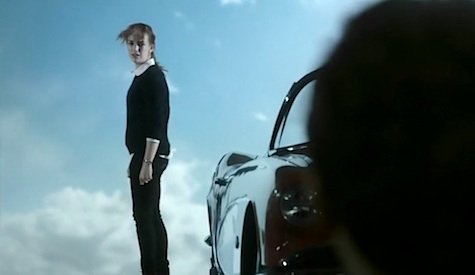Well…I liked the part where they “killed” the cute one?
This week’s episode of Agents of S.H.I.E.L.D. started out as straight up naptime and the episode itself seemingly realized that about 15 minutes in, taking a sharp turn away from its stock MacGuffin-of-the-Week plot to focus on a character exploration of Agent Gemma Simmons, perhaps with the hope of providing the audience with a story that they could more readily engage with.
To my mind, “FZZT” doesn’t succeed in that goal. But exploring why it doesn’t helps clarify some recurring problems that the show and its viewers are struggling with.
A quick recap for those interested: Random men in a rural area are being killed in an odd manner; their bodies found hovering in mid-air with electricity all around. Fitz and Simmons suss out that their bodies are generating electricity internally, and that the men died when that energy erupted from their bodies. They find the culprit in a Chitauri helmet kept at a nearby firehouse—a trophy from when the firemen came to assist the recovery after the Battle of New York. Unfortunately, the alien helmet carried an alien virus which is transmitted through static electricity, which is why the seemingly random men—all of them firefighters from the same crew—died in such a weird manner.
Simmons, being front and center in the investigation, ends up getting infected and the rest of the episode is spent racing the clock as she develops a cure under quarantine and the rest of the crew contemplate having to kill her before the virus erupts. Simmons chooses to off herself just as one of the attempted cures turns out to have worked and Ward does some serious superheroing to go get her. Day saved, everyone happy! Except Coulson, but we’ll get to that.
Sounds exciting, right? It somehow wasn’t, and this isn’t a problem that is unique to “FZZT” either. I’ve been having a hard time pinning down just what remains so unsatisfying about Agents of S.H.I.E.L.D., though, and “FZZT” helped solidify why the show feels so…thin.
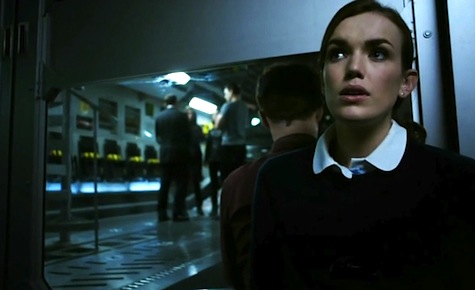
1. We don’t know anything more about these characters than we did when the show started, despite the raised stakes.
This was “FZZT”’s biggest stumble. Having Fitz or Simmons put in a certain death situation is a good idea on the face of it. So far, they’ve been portrayed as secondary characters and the show needs to give us more from them besides adorable technobabble. An extreme scenario is also a good way to show a character outside of their usual comfort zone, and the new facets of their personality that result from that scenario help us engage with them more fully.
Unfortunately, doing this to Simmons in this episode doesn’t end up telling us anything new about her. We already knew she was dedicated to her work, we already knew that Fitz is dedicated to her, we already knew that she is compassionate and loyal to the team. Putting her in a situation where she’s racing the clock to stave off death didn’t reveal any cracks in that personality, or give us a deeper understanding as to why she’s like that. We also don’t know anything more about why she’s in S.H.I.E.L.D., besides the very general reason that she considered it a huge opportunity.
This reinforcement of character traits can be a potent story if it comes at the right time, but usually that “right” time is after a character has brought disaster upon others by acting out of character. We don’t even know what Simmons’ character is yet.
And she’s not alone in this. Pretty much the only person we’ve been given anything of depth about is Skye. Fitz, Ward, and May are still barely-there presences, six episodes in. Coulson himself only barely gets any additional characterization, which is weird when you consider the other problem Agents of S.H.I.E.L.D. currently has.
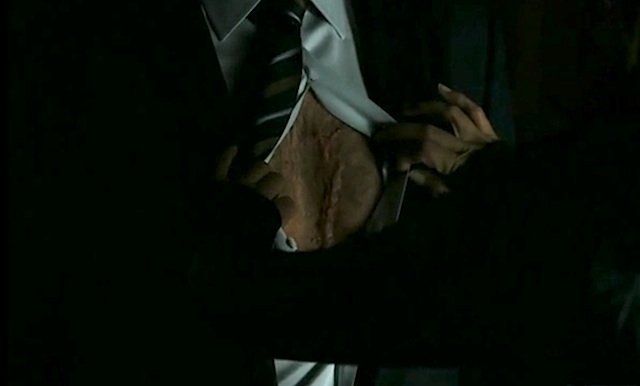
2. The mystery of Coulson remains the most interesting aspect of the show.
Coulson sitting down with the fireman-about-to-explode was far and away the most interesting scene during the entire Chitauri helmet sequence. It didn’t have anything to do with the Marvel universe or superhero stuff or S.H.I.E.L.D., it was just Coulson talking about dying.
It told us something new about Coulson’s viewpoint on the world (and worlds beyond) and it gave us something more to chew on in regards to how he survived being stabbed by Loki. Both enhance how we see Coulson and how we relate to him. Was he lying when he said dying was “beautiful”? If so, what does that say about Coulson’s empathy for others? If not, what else does that say about what happened to him?
The episode does a great job of spending some time with Coulson’s own exploration of his death. Later on, when he admits to May that he doesn’t feel fine…just different…we’re again learning more about Coulson’s personality while learning another clue to the mystery of his survival. We now know that Coulson bears some pretty grisly scars from Loki’s staff, and that to his perspective he’s not the same person that he was before the events of The Avengers. This ties into the main theme behind Agents of S.H.I.E.L.D., too, about what happens to the little people who get in the way of the Big Heroes.
It’s great! The show needs more of this, but aside from small scenes like this, it feels like Coulson has been sidelined. The mystery of his survival has been intriguing, and I can why the show avoids focusing on it, but it’s also avoiding exploring any other aspects of Coulson’s character. The show can’t coast on the mystery of his survival forever, and when that’s finally out in the open we’ll need other reasons to care about Coulson and his team besides empty “that’s why they’re the best” platitudes. So far, Agents of S.H.I.E.L.D. hasn’t delivered on that front.
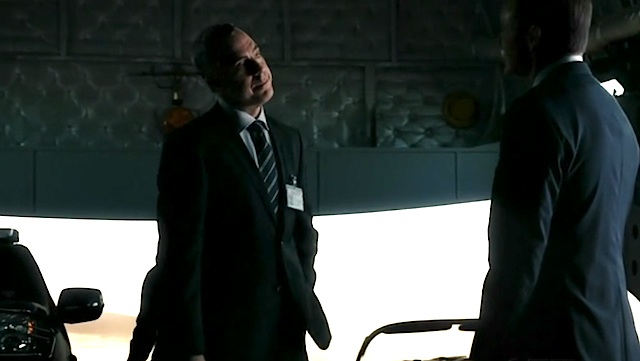
3. We’re not exploring the world of S.H.I.E.L.D. as much as we could.
S.H.I.E.L.D. is a weird organization. Its legal authority is undefined, it regularly kidnaps people, blows things up, buries or burns technology it considers dangerous, and invades your privacy. It’s also assisting the Avengers, has really cool toys, and has a high-ranking good guy like Coulson, so there’s obviously some upside here. But that just makes the organization all the more intriguing. What’s their stated purpose? What’s up with them?
As evidenced throughout the show, the more we know about S.H.I.E.L.D. the more we know about our characters. Do Fitz and Simmons see it as a cutting edge research resource? We know that Skye sees it as a threat to intellectual liberty. We know that Ward is unquestioning. We…don’t know anything about May. And we know that Coulson is unquestioning but seems to feel a need to temper the edges of the organization.
By the end of “FZZT,” we get the impression that S.H.I.E.L.D. will probably be keeping a closer eye on Coulson’s team. Will we be seeing more questioning and probing of S.H.I.E.L.D. from the show as it moves forward? The preview for next week’s episode seemed to hint at this, so let’s hope so. A better definition of S.H.I.E.L.D. means a better definition of everyone else. It would also give the show something to focus on that isn’t just another MacGuffin-of-the-Week, which the show desperately needs.
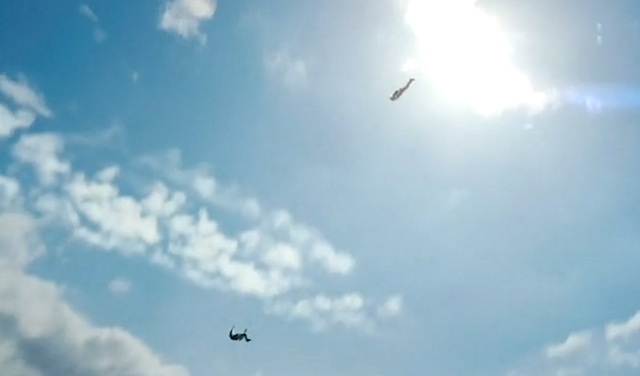
4. Whatever the show presents as fantastic has a hard time trumping its audience’s imagination.
As I said above, the episode itself seemed to realize this as it attempted this week’s MacGuffin-of-the-Week plot about the Chitauri helmet. I was expecting that the team’s search would take up the majority of the episode and was pleasantly surprised when the episode just kind of dropped it in favor of spending time focusing in on Simmons.
While Agents of S.H.I.E.L.D. is a perfect platform for introducing wacky sci-fi superhero concepts to a mainstream audience, it has to really, really work to impress those already familiar with comics, the Marvel universe, or science fiction in general. The concept of an alien virus that infects via static already fits well within our horizons. (In fact, I’m almost certain that was in an episode of Star Trek: The Next Generation.) And the more that superheroes and science fiction fill movie and TV screens, the more rote such fantastic concepts will become.
This is a common issue in any science fiction; that despite how imaginative you can be there’s always going to be someone who sees it coming. Some of the very best sci-fi tales, in print or on the screen, sidestep this by having the MacGuffin affect their characters’ lives in profound ways. Agents of S.H.I.E.L.D.’s best episodes so far (The pilot and “Eye Spy,” I think.) do this, and “FZZT” similarly abandons its plot to do this with Simmons. Then it does it again with Coulson! It’s an approach that has defined Marvel Comics over the decades, and as evidenced by that fact that I’m writing about a Marvel TV show in the first place, it’s obviously an approach that works. In fact, if Simmons’ story hadn’t floundered then I probably would have come away thinking about the episode in a far more positive light.
Tidbits
- I didn’t think May locking the camp counselor inside of their interrogation room, after he just saw his friend die, was at all funny. Despite the offer of cookies.
- Ward’s reaction to the virus, about it not being something he could hit or protect anybody from, was an interesting note to play. My immediate thought was that Ward would be SERIOUS trouble if he ever got superpowers. Then, of course, he totally pulls a Superman at the end of the episode.
- How many of you thought we’d see an arc reactor when Coulson opened his shirt?
- I think the actor playing Skye is better than we give her credit for. In only a few lines she really outlined how awkward Skye’s relationship with the team is now, and how desperately she wants things to go back to the way they were. (See also: The overly passionate hug she gave to someone she barely talks to.)
- Word on the “street” is that the episode two weeks from now (“The Well”) is going to be a reaction piece to Thor: The Dark World. Hooray!
- This week in That’s Not How That Works: Air pressure, temperature, mass. (But the skydive was cool to watch anyhow.)
Chris Lough is the resident Agents of S.H.I.E.L.D. recapper on Tor.com and would also smack Fitz with a fire hydrant. For reasons.










